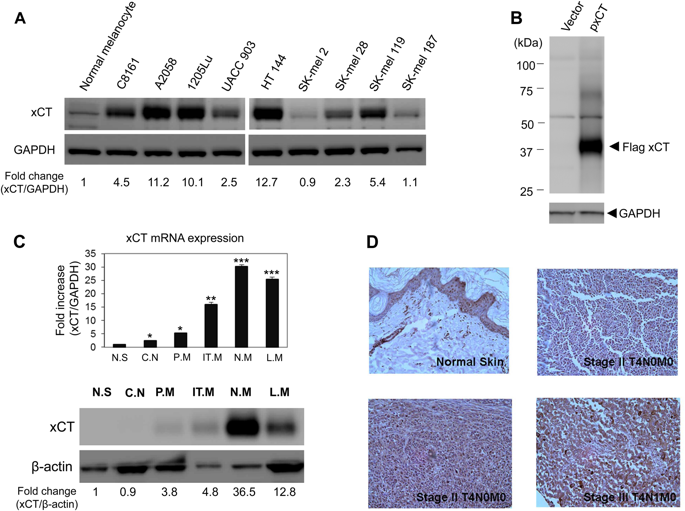Oncogenesis ( IF 5.9 ) Pub Date : 2018-11-14 , DOI: 10.1038/s41389-018-0098-7 Seung-Shick Shin , Byeong-Seon Jeong , Brian A. Wall , Jiadong Li , Naing Lin Shan , Yu Wen , James S. Goydos , Suzie Chen

|
Our research group demonstrated that riluzole, an inhibitor of glutamatergic signaling reduced melanoma cell proliferation in vitro and tumor progression in vivo. The underlying mechanisms of riluzole are largely unknown. Microarray analyses on two human melanoma cell lines revealed that riluzole stimulates expression of the cystine-glutamate amino acid antiporter, xCT (SLC7A11). Western immunoblot analysis from cultured human melanoma or normal melanocytic cells showed that xCT was significantly overexpressed in most melanomas, but not normal cells. Studies using human tumor biopsy samples demonstrated that overexpression of xCT was correlated with cancer stage and progression. To further investigate if xCT is involved in melanoma cell growth, we derived several stable clones through transfection of exogenous xCT to melanoma cells that originally showed very low expression of xCT. The elevated xCT expression promoted cell proliferation in vitro and inversely, these melanoma clones showed a dose-dependent decrease in cell proliferation in response to riluzole treatment. Xenograft studies showed that these clones formed very aggressive tumors at a higher rate compared to vector controls. Conversely, treatment of xenograft-bearing animals with riluzole down-regulated xCT expression suggesting that xCT is a molecular target of riluzole. Furthermore, protein lysates from tumor biopsies of patients that participated in a riluzole monotherapy phase II clinical trial showed a reduction in xCT levels in post-treatment specimens from patients with stable disease. Taken together, our results show that xCT may be utilized as a marker to monitor patients undergoing riluzole-based chemotherapies.
中文翻译:

xCT参与体外黑色素瘤细胞增殖和体内肿瘤发生
我们的研究小组证明,谷氨酰胺能信号抑制剂riluzole可以降低黑素瘤细胞的体外增殖和体内肿瘤的进程。利鲁唑的潜在机制在很大程度上尚不清楚。对两种人类黑素瘤细胞系的芯片分析表明,利鲁唑刺激胱氨酸-谷氨酸氨基酸反转运蛋白xCT(SLC7A11)的表达。从培养的人黑素瘤或正常的黑素细胞中进行的Western免疫印迹分析表明,xCT在大多数黑素瘤中均显着过表达,但在正常细胞中却没有。使用人类肿瘤活检样本的研究表明,xCT的过度表达与癌症的分期和进展相关。为了进一步研究xCT是否与黑色素瘤细胞的生长有关,我们通过将外源性xCT转染到原本显示xCT表达非常低的黑色素瘤细胞中,得到了几个稳定的克隆。升高的xCT表达在体外促进细胞增殖,相反,这些黑素瘤克隆显示出对利鲁唑治疗的反应,其细胞增殖呈剂量依赖性降低。异种移植研究表明,与载体对照相比,这些克隆以更高的速率形成了高度侵袭性的肿瘤。相反,用利鲁唑下调xCT表达来治疗带有异种移植物的动物,这表明xCT是利鲁唑的分子靶标。此外,参加了利鲁唑单药治疗II期临床试验的患者的肿瘤活检蛋白裂解物显示,患有稳定疾病的患者的治疗后标本中的xCT水平降低。在一起































 京公网安备 11010802027423号
京公网安备 11010802027423号